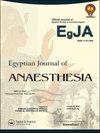Impact of COVID-19 pandemic on anesthesia resident’s training program in Cairo University Hospital
IF 0.5
Q3 ANESTHESIOLOGY
引用次数: 1
Abstract
Background: The purpose of this study was to evaluate the impact of COVID-19 pandemic on the training process of anesthesia residents in Cairo University Hospital regarding technical skills, operative, and critical care experience. Method(s): This cross-sectional survey study included two groups of anesthesia residents according to the time of their residency in relation to the pandemic (before-pandemic group [N = 44] and during-pandemic group [N = 42]). The participants were asked to fill out a questionnaire regarding their training. The questionnaire included technical skills experience (regional anesthesia, vascular access, and advanced airway techniques, soft tissue ultrasound), operative and critical care experience, and duration of intensive care unit (ICU) rotation. The quality of training was graded as adequate, moderate, or deficient training according to the number of performed procedure/managed cases. Comparisons of continuous data were done using the Mann-Whitney test, and qualitative categorical was analyzed using the chi-square test. Result(s): All the participants completed the questionnaire. The training in the during-pandemic group was lesser than that in the before-pandemic group for most of the technical skills except for soft tissue ultrasound which was more in the during-pandemic group. The operative experience was less in the during-pandemic group than that in the before-pandemic group. On the other hand, the ICU experience was more in the during-pandemic group than that in the before-pandemic group. Conclusion(s): The COVID-19 pandemic disrupted the training program of anesthesiology residents with regard to elective procedures and produced over-training in critical care subspeciality.Copyright © 2023 The Author(s). Published by Informa UK Limited, trading as Taylor & Francis Group.新冠肺炎疫情对开罗大学医院麻醉住院医师培训的影响
背景:本研究的目的是评估2019冠状病毒病大流行对开罗大学医院麻醉住院医师技术技能、手术和重症监护经验培训过程的影响。方法:本横断面调查研究将两组麻醉住院医师按其与大流行相关的住院时间分为大流行前组[N = 44]和大流行期间组[N = 42]。参与者被要求填写一份关于他们训练的问卷。问卷内容包括技术技能经验(区域麻醉、血管通路、先进气道技术、软组织超声)、手术和重症监护经验以及重症监护病房(ICU)轮转时间。根据执行程序/管理病例的数量,培训质量被分为充分、中等或缺乏培训。连续资料比较采用Mann-Whitney检验,定性分类分析采用卡方检验。结果:所有参与者均完成了问卷调查。除软组织超声外,大流行期间组在大多数技术技能方面的培训都少于大流行前组,大流行期间组的培训更多。大流行期间组的手术经验少于大流行前组。另一方面,大流行期间组的ICU经验多于大流行前组。结论:2019冠状病毒病大流行打乱了麻醉住院医师在选择性手术方面的培训计划,并在重症亚专科产生了过度培训。版权所有©2023作者。由Informa UK Limited出版,以Taylor & Francis Group的名义进行交易。
本文章由计算机程序翻译,如有差异,请以英文原文为准。
求助全文
约1分钟内获得全文
求助全文
来源期刊

Egyptian Journal of Anaesthesia
Medicine-Anesthesiology and Pain Medicine
CiteScore
0.90
自引率
0.00%
发文量
78
 求助内容:
求助内容: 应助结果提醒方式:
应助结果提醒方式:


